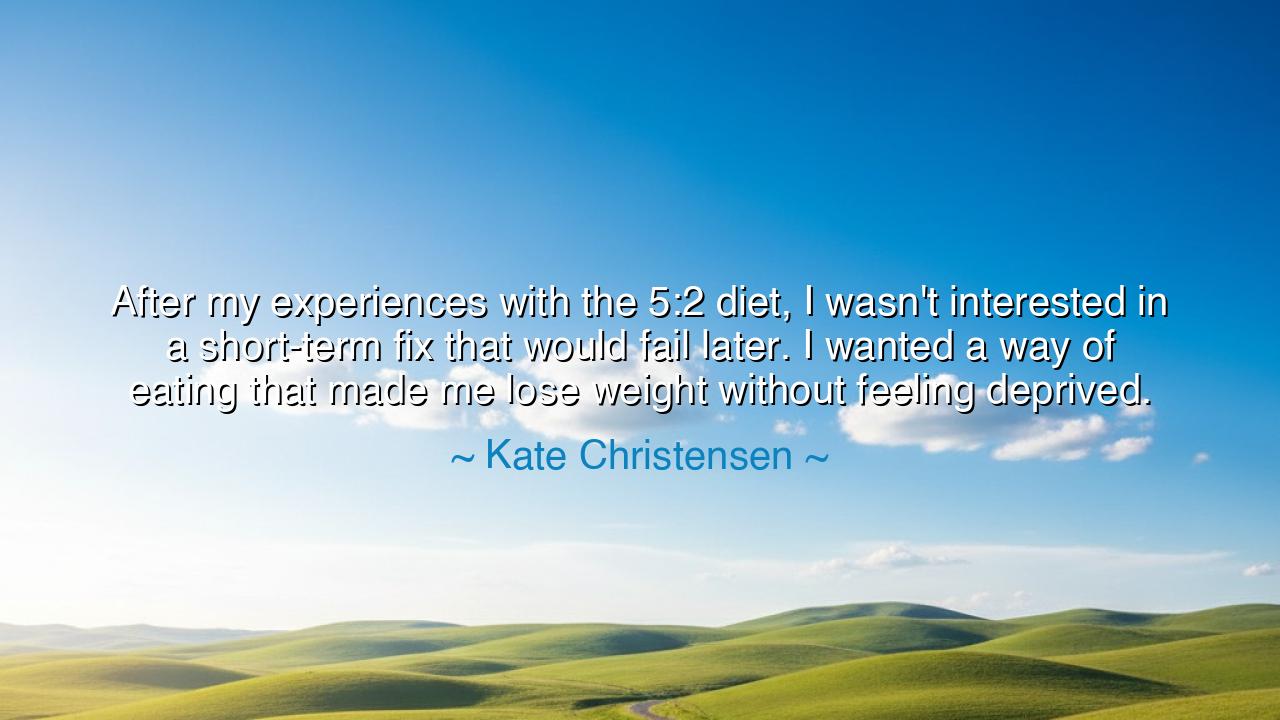
After my experiences with the 5:2 diet, I wasn't interested in a
After my experiences with the 5:2 diet, I wasn't interested in a short-term fix that would fail later. I wanted a way of eating that made me lose weight without feeling deprived.






The words of Kate Christensen, “After my experiences with the 5:2 diet, I wasn’t interested in a short-term fix that would fail later. I wanted a way of eating that made me lose weight without feeling deprived,” speak with the voice of one who has walked through struggle and come to wisdom. They are not merely about food or body, but about the deeper human yearning for balance, for sustainability, and for peace with oneself. Beneath her reflection lies a universal truth: that the path to harmony — whether of diet, health, or spirit — cannot be found in fleeting remedies, but only in ways of living that nourish rather than punish, that align rather than divide.
For in her rejection of the “short-term fix,” Christensen rejects one of the oldest illusions known to humankind: the illusion of easy salvation. The ancients, too, warned of such temptations. The philosopher Epictetus taught that no lasting good can arise from what is fleeting or forced. “Nothing great,” he said, “is created suddenly.” A diet, like a discipline of the soul, must not be a battle of willpower but a cultivation of wisdom. To seek a “quick fix” is to build upon sand; to seek a way of living, steady and kind, is to build upon stone. Thus, her words remind us that change that endures must grow from understanding, not from desperation.
The 5:2 diet, with its alternating days of fasting and indulgence, mirrors the cycle of excess and deprivation that has ensnared humanity for centuries. It promises control, yet breeds rebellion; it offers results, yet leaves emptiness in its wake. Christensen’s rejection of it is not a rejection of discipline, but of extremes — those forces that tear the self in two. The ancients of both East and West warned against such imbalance. The Buddha called it the Middle Way, the path between indulgence and asceticism. He knew, as Christensen came to know, that the spirit and the body both rebel when pushed too far. Harmony is not found in denial, but in moderation — in the quiet art of listening to the body’s wisdom instead of silencing it.
There is a story of Pythagoras, the philosopher and mystic, who taught his disciples that the harmony of the soul could be measured, like music, by proportion and balance. To eat, he said, is an act of sacred rhythm — one must neither starve the body nor drown it in excess. Each meal should be a note in the song of life, contributing to harmony rather than discord. Christensen’s desire for “a way of eating that made me lose weight without feeling deprived” echoes this same principle. She seeks not to fight against herself, but to walk in rhythm with her own needs, to make nourishment a source of peace rather than conflict.
Her journey is one that mirrors the pilgrimage of every seeker who has grown weary of struggle. In her words, we hear not only the weariness of physical diets but the exhaustion of spiritual diets — the constant attempts to fix ourselves through punishment, denial, and shame. How many of us live this way? Starving our joy for the sake of discipline, then binging on pleasure to ease the pain of restraint? Her realization — that deprivation cannot lead to peace — is the same truth discovered by sages and survivors alike: that wholeness comes not from suppression, but from integration.
Thus, her lesson transcends food and becomes a philosophy of living. To live well, one must seek paths that sustain, not consume; that heal, not exhaust. Whether in eating, working, or loving, we must abandon the fleeting for the enduring. True growth is slow, patient, and kind. The one who listens to their body, who honors hunger without fear and fullness without guilt, will come to know the deep contentment that no diet can offer — the contentment of alignment.
Let this, then, be the teaching: reject the quick fix, and choose the lasting way. Do not seek transformation through suffering, but through understanding. When you eat, eat in gratitude; when you hunger, ask what your body or spirit truly craves. Let your habits be gentle enough to endure and strong enough to guide you. For the way that denies joy will never bring peace, and the life that seeks only short-term reward will never find fulfillment.
And as Kate Christensen reminds us, the true “way of eating” — and of living — is not about the war between hunger and restraint, but about the reunion of body and soul. To live without feeling deprived is not indulgence; it is wisdom. It is the realization that the path to balance is not found in resistance, but in reverence — reverence for the body, for the earth that feeds it, and for the self that seeks not perfection, but peace.






AAdministratorAdministrator
Welcome, honored guests. Please leave a comment, we will respond soon